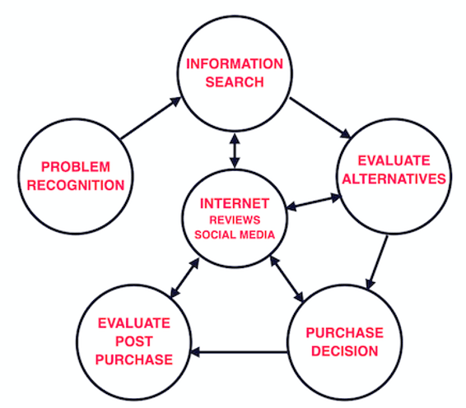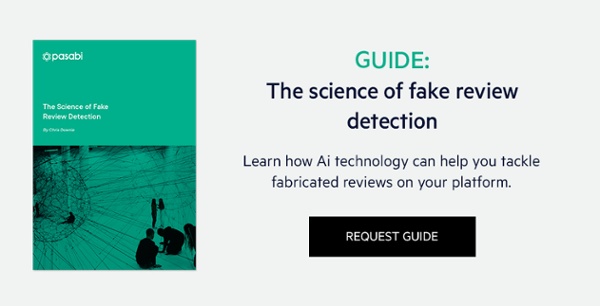“Everyday decision making around the world is constantly based on what came before us.”
Steve Berry (author).
Consumers in the developed world have an abundance of choice. Advances in technology and extensive global distribution networks have facilitated an explosion of choice in today’s digital marketplaces. Does this increased choice maximise consumer freedom and ultimately lead to better purchase outcomes? Let’s look at the decision making process and the role reviews play.
Five stage process
In marketing terms, consumers traditionally went through five stages in the decision making process.

During the problem recognition stage, the consumer identifies a need or want, such as buying a new car. They then need to carry out an information search to work out the available options based on their requirements and financial constraints. In the car example, they might consider whether they’re in the market for an SUV or a hatchback. Once they have identified some options, e.g. cars in a similar price bracket matching their requirements, they evaluate the alternatives, weighing up the pros and cons of each. This ultimately leads to making the purchase decision - choosing the car that best suits their needs based on findings from each of the preceding stages. Lastly, the consumer does some post-purchase evaluation to determine whether or not they made the right choice.

With the advent of e-commerce, the buyer journey has evolved over the last 25 years from a linear model to one where the Internet sits at the hub of consumer searching for product information and validating purchase decisions via reviews and social media influencers. The Internet has both increased accessibility and shortened the time to purchase.
Paradox of choice
The decision making process overloads the consumer with decisions at every stage. What do I want? Where is it available? Which one is better? Should I buy it? Did I make the right choice? The freedom to choose makes it a difficult process. According to American psychologist and author, Barry Schwartz, paralysis or inaction can be a consequence of too much choice. The paradox of choice is where an abundance of similar options causes psychological stress. The more choice there is, the harder it is to make a decision.
Consider a time when buying a coffee meant asking for ‘a cup of coffee’. Nowadays there’s a cornucopia of caffeinated beverages - cappuccinos, espressos, lattes, macchiatos and flat whites - with yet more decisions to be made. Full-fat, skinny or soya milk? Single shot, double shot or hazelnut? Costa, Starbucks or Caffe Nero? The list goes on. So, imagine a mechanism that makes decision making easier. That mechanism is reviews.
Tried, tested and trusted
Reviews help inform and narrow down a consumer’s choice to the most likely or pertinent options. They help consumers navigate the sea of alternatives. Almost 9 out of 10 consumers read online reviews before making a purchase (Trustpilot 2020). Online reviews are now perceived to be more trusted than advertising campaigns, with 84% of consumers trusting reviews as much as personal recommendations from people they know. This indicates buyers have a high level of confidence and faith in peers’ opinions. Trustpilot’s study highlighted that digital advertising is met with indifference or suspicion by most consumers, unless it is backed by the social proof of online reviews.
Around 6 in 10 people of those surveyed reported that balanced reviews, with less than perfect scores, held more credibility than five-star feedback. Consumers trusted the former to be more authentic. They believed the inclusion of a pros and cons list was a strong indicator of review quality and validity. This assumption could stem from concerns regarding fake reviews.
Typically, consumers read an average of between one and six reviews before making a decision (Bizrate Insights 2019). More than half of those surveyed read at least four online reviews to help inform their purchase decision.
Star ratings are also used in the decision making process - consumers use star ratings filters as a way to refine their online search results and potential brand choice. On average, 3.5 stars is the minimum rating accepted by online shoppers for retail, but a higher rating is generally demanded for high-value purchases (e.g. electronics, cars, holidays).
Buyer’s remorse
When making a purchase decision, buyers experience two opposing forces simultaneously - avoidance system, the desire to avoid risks and negative outcomes, and the approach system, focusing on doing whatever makes them happy at the time. The challenge is to satisfy both forces which ultimately leads to a compromise between what buyers want and should choose. Buyer’s remorse refers to a period of regret associated with a purchase decision. Consumers are keen to minimise such regret and do so by investing time seeking out online reviews at the evaluation of alternatives stage in the decision making process.
What does this mean for brands?
The consequence for brands is that trustworthy, online reviews are paramount to optimise consumer conversion. A positive customer journey pervades beyond a single purchase experience. A favourable review encourages future buyers to purchase. A negative review has the opposite effect.
Reviews play a vital role in post-purchase customer service. They allow brands to engage with the customer and gain insights. These insights can inform refinements to the customer experience. Enhancements help improve the experience, build a loyal customer base, increase the likelihood of repeat purchases and potentially attract new customers. Issues that are addressed and resolved swiftly can make the difference between a customer leaving a one-star and four-star review.
According to the Trustpilot research, 77% of poor reviews are the result of negative experiences post-purchase. Issues relating to delivery, returns and refund policies can translate into a poor shopping experience resulting in unfavourable reviews. The customer’s last impression of the brand becomes even more important than their first. Reviewers now have the potential to be influencers and the popularity of social media affords future buyers a means to be influenced.
Reviews - a ‘must-have’
An article in Retail Times (April 2019) revealed 30% of UK consumers don’t trust brands that don’t provide reviews. They presume they have something to hide.
Consumer research conducted in 2019 by One Poll in conjunction with analysis from 50 UK retailers, revealed that despite the crucial role of reviews in the decision making process, its adoption varies across the retail sector:
- Only 50% of footwear brands surveyed provided ratings and reviews
- Less than two thirds of jewellery, accessories and electronics brands share their reviews on their websites
The growth of online shopping means reviews are even more important when consumers can’t touch or try products before they buy. Consumers are reliant on feedback from their peers to inform their purchase decision. Valuable opportunities for improved conversion rates and increased spend are being missed when retailers fail to provide such information.
Peace of mind
Authentic reviews give consumers peace of mind and validation in their decision making. In the first instance, they provide important information and evidence as to the claims being made by a brand for a product or service. Equally importantly, however, they showcase a brand’s customer service and highlight what happens when things go wrong. The knowledge that unexpected issues will be addressed and resolved can be a significantly influential factor for consumers in making their decision to buy. This helps mitigate risk, gives consumers confidence that they’ve made the right purchase decision ultimately leading to better purchase outcomes.
If you’re interested in diving deeper into the topic of consumer reviews, why not have a look at The Authenticity of Online Reviews and Consumer Trust or check out our fake review detection solutions page.


